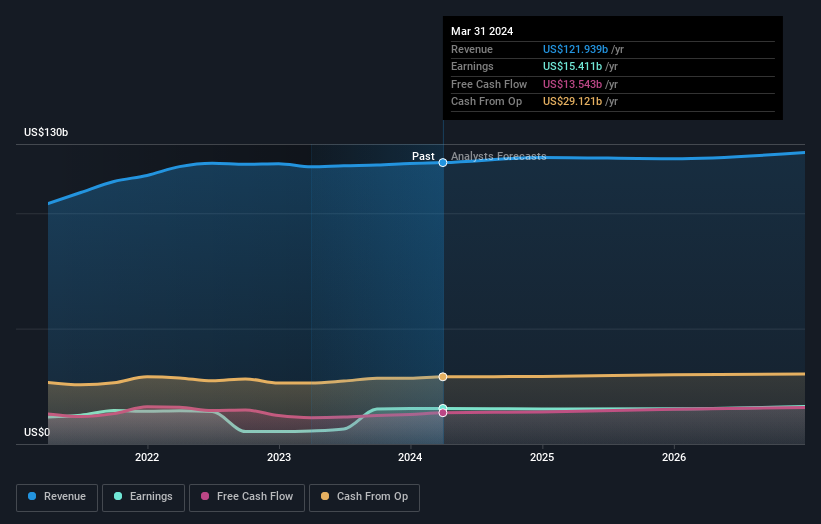- United States
- /
- Media
- /
- NasdaqGS:CMCSA
Earnings Beat: Comcast Corporation Just Beat Analyst Forecasts, And Analysts Have Been Updating Their Models
Last week, you might have seen that Comcast Corporation (NASDAQ:CMCSA) released its quarterly result to the market. The early response was not positive, with shares down 4.2% to US$38.57 in the past week. The result was positive overall - although revenues of US$30b were in line with what the analysts predicted, Comcast surprised by delivering a statutory profit of US$0.97 per share, modestly greater than expected. The analysts typically update their forecasts at each earnings report, and we can judge from their estimates whether their view of the company has changed or if there are any new concerns to be aware of. So we collected the latest post-earnings statutory consensus estimates to see what could be in store for next year.
See our latest analysis for Comcast

Following last week's earnings report, Comcast's 28 analysts are forecasting 2024 revenues to be US$124.2b, approximately in line with the last 12 months. Statutory per share are forecast to be US$3.89, approximately in line with the last 12 months. Yet prior to the latest earnings, the analysts had been anticipated revenues of US$124.2b and earnings per share (EPS) of US$3.93 in 2024. The consensus analysts don't seem to have seen anything in these results that would have changed their view on the business, given there's been no major change to their estimates.
There were no changes to revenue or earnings estimates or the price target of US$48.50, suggesting that the company has met expectations in its recent result. It could also be instructive to look at the range of analyst estimates, to evaluate how different the outlier opinions are from the mean. Currently, the most bullish analyst values Comcast at US$56.00 per share, while the most bearish prices it at US$42.00. With such a narrow range of valuations, the analysts apparently share similar views on what they think the business is worth.
Taking a look at the bigger picture now, one of the ways we can understand these forecasts is to see how they compare to both past performance and industry growth estimates. It's pretty clear that there is an expectation that Comcast's revenue growth will slow down substantially, with revenues to the end of 2024 expected to display 2.5% growth on an annualised basis. This is compared to a historical growth rate of 4.1% over the past five years. By way of comparison, the other companies in this industry with analyst coverage are forecast to grow their revenue at 3.2% per year. So it's pretty clear that, while revenue growth is expected to slow down, the wider industry is also expected to grow faster than Comcast.
The Bottom Line
The most important thing to take away is that there's been no major change in sentiment, with the analysts reconfirming that the business is performing in line with their previous earnings per share estimates. On the plus side, there were no major changes to revenue estimates; although forecasts imply they will perform worse than the wider industry. There was no real change to the consensus price target, suggesting that the intrinsic value of the business has not undergone any major changes with the latest estimates.
With that said, the long-term trajectory of the company's earnings is a lot more important than next year. We have estimates - from multiple Comcast analysts - going out to 2026, and you can see them free on our platform here.
You should always think about risks though. Case in point, we've spotted 2 warning signs for Comcast you should be aware of.
New: AI Stock Screener & Alerts
Our new AI Stock Screener scans the market every day to uncover opportunities.
• Dividend Powerhouses (3%+ Yield)
• Undervalued Small Caps with Insider Buying
• High growth Tech and AI Companies
Or build your own from over 50 metrics.
Have feedback on this article? Concerned about the content? Get in touch with us directly. Alternatively, email editorial-team (at) simplywallst.com.
This article by Simply Wall St is general in nature. We provide commentary based on historical data and analyst forecasts only using an unbiased methodology and our articles are not intended to be financial advice. It does not constitute a recommendation to buy or sell any stock, and does not take account of your objectives, or your financial situation. We aim to bring you long-term focused analysis driven by fundamental data. Note that our analysis may not factor in the latest price-sensitive company announcements or qualitative material. Simply Wall St has no position in any stocks mentioned.
About NasdaqGS:CMCSA
Very undervalued 6 star dividend payer.
Similar Companies
Market Insights
Community Narratives



